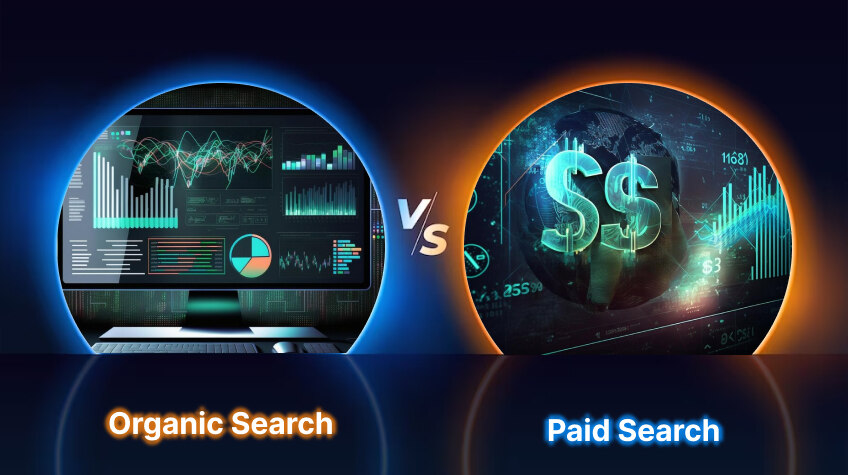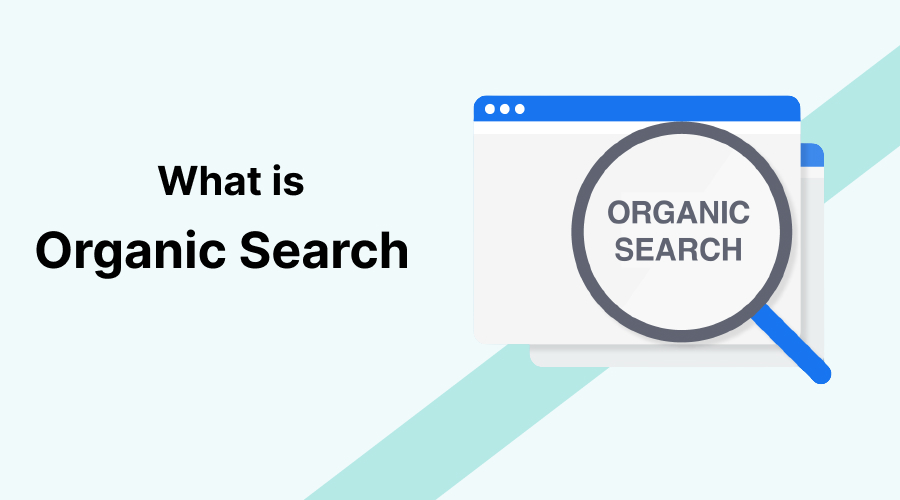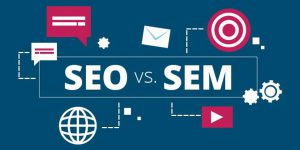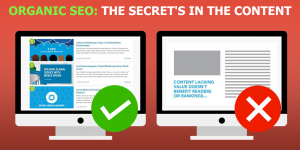
Gone are the days when word of mouth was enough to promote a product or service. Today, marketers and business owners put in a lot of effort to promote their brands, and SEO, particularly organic and paid search, is the most important part of it.
When it’s about SEO, both organic and paid search play a crucial role. They are an integral part of any digital marketing strategy. Organic and paid advertising complement one another to help you reach the top of the results page. This means that you should strive to be at the very top of the search engine results page (SERP).
But that’s not it! There is more to SEO and PPC search, and in this post, we shall discuss everything about organic and paid search, including organic vs paid search differences.
So, let’s get started…
Table of Contents
- What exactly is meant by Organic Search?
- What does Paid Search stand for?
- How Organic Search (SEO) Differs from Pay-Per-Click (PPC) Advertising?
- Why is it Crucial to combine Organic and Paid Search Strategies?
- Helps Create a Better Brand Reputation
- Increase your Site’s Rankings in Search Engines
- Maximized ROI
- Supports Marketing Channels
- Helps Maintain Consistency
- Reduce Cost
- Broadens Marketing Perspective
- Retain Customers
- Help Gain the Confidence of your Target Audience
- Offers Data that can be Put into Action
- How does an Organic and Paid Search Work Together?
- What KPIs are Essential to Monitor Organic vs Paid Search?
We’ll start with the basics of organic and paid search engines before moving on to why you need them both. Take a look…
What exactly is meant by Organic Search?

The term “organic search” refers to any results that appear on the Search Engine Results Page, otherwise known as SERP. Organic Search, as the name says, does not need payment. The process of organic search begins the moment users enter a word or group of words into the search engine. The word or group of words used by users in order to conduct a search are called keywords.
A search algorithm is begun the moment keywords are entered. The search engine visits every website that provides relevant results matching the entered keywords. The listing of those websites is determined by the same algorithm, which takes into account certain metrics and other data on those websites.
Once search engines successfully find out content relevant to keywords entered by users, a huge number of websites appear on search engines. All the websites are sorted based on their popularity and credibility.
Every website has the ability to rank highly in organic search results by implementing a few simple changes and improvements. The SERP relevance of a website can be increased by several means, including SEO (Search Engine Optimization), reducing loading times, and raising content quality.
Among all, SEO is the most effective method for boosting a website’s visibility in online searches. Marketers, especially digital marketers, make use of SEO to rank a website on top of search engine results pages. Using relevant keywords and high-quality content are the best methods to improve organic search results.
What does Paid Search stand for?
Paying a third party to boost your website’s visibility in search engine results is what’s known as “Paid Search.” The primary goal of pay-per-click advertising is to increase conversions or sales. When you search for something, the results that appear on the search engine results page (SERP) include both organic and paid search results.
Paid searches follow a similar method to organic ones, but they focus on different places to find their results. Instead of searching the whole internet and checking out every result, they just check out the client’s site. As a result, a different set of characteristics than those that influence the organic search results decide the list of websites that are displayed when executing a paid search.
There are a variety of factors that could affect which website appears first in a search result. Bidding on specific keywords is one of the most important factors taken into account by the algorithm. In addition, search engines will take into account the keywords you choose and the visibility options you enable.
When it comes to paid search, Pay-per-click advertising or PPC advertising is by far the most common choice. PPC is a specific type of sponsored search service. In Pay-per-click, as the name says, you will only be charged when one of your ads is actually clicked.
How Organic Search (SEO) Differs from Pay-Per-Click (PPC) Advertising?
Both organic and paid search are unique; however, there are significant differences between the two. Here are some of the major differences between organic vs paid search:
SEO, or search engine optimization, is a set of practices centered on improving a website’s visibility in organic search results. Incorporating keywords and relevant information throughout the site helps search engine specialists determine its relevance to a user’s query.
Whereas, Pay-per-click (PPC) techniques encompass everything from Google AdWords to advertisements on social media platforms like Facebook, YouTube, and Instagram. Clicking on these adverts takes users to specific web pages.
Using organic search results does not cost anything; however, using paid search does cost money.
Due to the nature of how paid search works, it is possible to obtain results immediately. If the keyword bidding is done correctly, you will be able to see your link at the top of the PPC results from the very beginning.
Results suggest that organic search results are more likely to be trusted by the audience they’re intended for. Organic search engine results are the most effective way to get targeted traffic to a website. What they need is ultimately something you have to offer. But when it comes to Paid Search, results attract users who are most likely to make a purchase.
Lastly, Organic Search continue to have the same place in the ranking if all the conditions are met consistently. But that’s not the case with Paid Search. Your advertisement will be removed from the search engine results page (SERP) if your paid campaign runs out of money.
Why is it Crucial to combine Organic and Paid Search Strategies?
There are many advantages to combining organic and paid search together. Take a look at some of them
1. Helps Create a Better Brand Reputation
We are living in the era of brand and branding. Everything from our daily needs items to luxury items are now sold by reputable brands. The business ecosystem has changed tremendously. Today, marketers focus on developing strategies that can help in brand building and brand recognition.
When it comes to building or enhancing brand reputation, both organic and paid search help tremendously. Using organic search, you can cultivate customers’ trust. And with paid search, you can evaluate which consumers are exposed to your brand and visit your site via owned, paid, and earned media by their journey to purchase.
Organic search phrases can do their job, but you still need your company’s brand in front of more potential buyers to take them to the top of the funnel. All you need to make sure of is the bottom of your funnel is functioning properly. Search is generally the driving force behind improved efficiency.
You may use paid search retargeting to re-engage non-converting visitors to your site. Having properly crawled and indexed landing pages is a prerequisite to succeeding in paid search.
Your customers are your brand advocates. Inquire about their experiences with your company and its products. Also, ask them if they can give reviews and feedback on your site or share your content with their social media followers. Doing so will help you establish a reputation with your customers and gain their confidence in your brand.
2. Increase your Site’s Rankings in Search Engines
When it comes to marketing these days, it can never be organic vs paid search. Both organic and paid search go hand in hand when it comes to enhancing a site’s ranking in search engines. Each supports the other, boosting customers’ conviction in the company’s legitimacy.
Integrating sponsored search with earned searches might provide your company the extra exposure it needs to compete and win for searchers’ attention. Service-based firms can benefit greatly from increased visibility in search engine results pages (SERPs) by integrating SEO and PPC.
3. Maximized ROI
Increased ROI or profits is what we all strive for. Of course, you do not want to end up both your time and energy on something that doesn’t yield positive results. Incorporating both organic and paid search into your marketing strategy can help you maximized ROI.
There are various ways you can improve your organic search results, such as optimizing your website, incorporating high-quality content, improving loading time, making your website responsive, and so on.
Meanwhile, with paid search, you’re essentially staking money on a strategy you hope will pay off. You can expect to get impressive returns with paid search. Moreover, with paid search, you can be sure of targeting sure-shot customers. It is because there, you have the option to apply filters and customize your paid search according to your needs. All in all, implementing the two together can help you achieve your goals impressively.
4. Supports Marketing Channels
Both earned search and paid search now contribute to the establishment of other marketing channels, such as social media marketing and email marketing. Putting organically grown and well-managed content across social media accounts can help tremendously. Aside from that, you can include an email subscription option on your website.
Through the utilization of a variety of landing sites and paid search, you can cultivate a social media or email marketing campaign. PPC is one of the best ways to improve your organic results.
5. Helps Maintain Consistency
We all know that the world of the internet is not stable at all. Today you may see a website ranking very high; however, tomorrow, it may be replaced by another site. Therefore, maintaining consistency becomes crucial more than ever.
Combining both organic and paid searches becomes imperative to maintain consistency. This is because paid ad rank is stable, whereas organic search results fluctuate.
Your total standing could fluctuate from one day to the next. Sometimes two of your websites will show up on the first page of search results for the same term, and other times none of them will. Since we now know that Google’s algorithm evolves regularly and user interface needs vary, organic rankings appear more volatile and ever-changing than ever before.
In such a situation, incorporating both SEO and PPC becomes crucial. Paid searches are usually very consistent. All you have to do is to optimize your AdWords account, quality score, budget, and bidding tactics. Aside from that, daily monitoring and a bit of tweaking can help your ads rank high.
6. Reduce Cost
Know that marketing is a pricey affair. You need to put in a lot of effort and time to stay ahead in the industry. However, if you focus your paid and organic clicks on the highest-converting keywords, you may easily raise your site’s overall traffic volume. You don’t need to put your money into costly advertising strategies.
Just developing the right content and switching expensive, high-volume, or low-conversion (but still effective) terms from paid search to organic search will save money. Aside from that, customizing your ads according to your customer’s needs can help you with your paid search results. Furthermore, by bidding on various specialized terms, online visibility can be improved at little cost.
The best thing about Google’s ads is that you can spend any amount on paid search. It allows smaller firms to effectively compete and win for searchers’ attention.
7. Broadens Marketing Perspective
Organic vs. paid search understanding helps the team build strategies that work. As said earlier, it is never SEO vs. PPC; in fact, it is about how both SEO and PPC can be incorporated together to accomplish marketing goals.
Marketers may get a more holistic picture of how successful their digital advertising campaigns have been thanks to cross-channel reporting. They may make the necessary adjustments by learning how well or how poorly users are treated across channels. Knowing how users behave, how engaged they are, and how likely they are to convert helps marketers to make informed decisions. It eliminates ambiguity and helps you gain clarity on where to focus your efforts.
Also, it aids in group decision-making, such as suspending efforts for less competitive keywords while focusing on those that are already performing well naturally.
8. Retain Customers
Today’s business world is different. There is no dearth of competitors and rivals. In such a situation, maintaining a consistent place and retaining customers become a task. It is imperative for businesses to build long-term relationships with their customers. Building long-term relationships helps businesses retain their customers. And combining both organic and paid search in order to attract customers can help the company accomplish its goals.
Keep in mind that when a brand’s multiple channels are integrated under a unified management structure, the likelihood that a buyer will have faith in the brand increases. The results of both PPC and SEO might benefit from open communication and cooperation across teams.
9. Help Gain the Confidence of your Target Audience
We are living in a highly competitive era. There is no such thing as called monopoly today. Every business has its rivals. Even improving your product or service quality is not just enough. There is something more that you need to do in order to gain the confidence of your target audience. And that’s implanting the right marketing strategies.
Giving your audience what they need is essential. They are not just looking for your product or services; in fact, they’re more keen to know how you treat them. CUSTOMER EXPERIENCE plays a crucial role.
There are a wide variety of things that you can do to improve your customer’s experience. However, when it comes to the digital world, things do change. Of course, you have to be attentive while designing your website, uploading your content while using keywords or incorporating ads on Google Ads, or doing everything that needs to be done to attract your customers in the digital world.
Utilizing the right SEO and PPC strategies can help you rank high on SERPs. Your brand’s legitimacy is bolstered when users encounter both your sponsored adverts and top organic search results on the first page. It is crucial that SEO and SEM collaborate closely with one another while working towards their respective objectives.
10. Offers Data that can be put into Action
Last but not least, data is CRUCIAL! Without data, there is nothing you can do to succeed. Data is the heart and soul of any kind of marketing, including digital marketing, specifically in the form of metrics. As a result of this, employing digital channels comes with a significant number of benefits.
Utilizing organic search helps digital marketers to know how many people have visited the page in real-time. Aside from that, they can also gather information on bounce rate (Percentage of users who immediately leave a website after visiting it). Digital marketers can utilize all of this data to develop effective digital marketing strategies that incorporate both organic and paid search.
When it comes to paid search, metrics such as click-through rate, average time spent on a page, and even demographic data are typically displayed during a paid advertising campaign. Using this information, marketers can modify their keywords or increase their bids to boost the effectiveness of the ad.
Marketers analyze and forecast consumer behavior in order to determine what might be improved. Data helps marketers optimize their organic search results. Doing so boosts the site’s overall performance, allowing for better metrics and quicker achievement of goals.
How does an Organic and Paid Search Work Together?
Both organic and paid campaigns are crucial for the success of any business. None of the strategies, be it SEO or PPC, can help a business succeed in today’s market. In order to accomplish your business goal, it is vital to put a solid keyword strategy into motion. The majority of search engines place a significant amount of weight on the metadata that is incorporated in the PPC.
Therefore, to increase organic search, both the metadata and the tags need to be purposefully chosen and strategically positioned. The paid campaign comes in handy if an organic search is not effectively positioned. Both organic and paid search go hand in hand. They complement each other.
All you have to make sure of is that you know how to employ both SEO and PPC effectively. Once you know it, you can increase the size of your lead generation net by utilizing both channels.
The growth of your company depends very much on your SEO and PPC strategies. If implanted correctly, both searches can help you reach your target audience, engage them by providing something of value, and finally persuade them to take the appropriate actions.
The use of organic and paid search is not an “either-or” in any case. Using both SEO and PPC helps you achieve your business goals, including increased ROI, attracting target customers, establishing your brand as a credible authority in its respective industry, and so on. The PPC advertisements positioned in your niche can help you rank high organically. Moreover, they provide your customers with two ways to locate your products across the buyer’s funnel.
In a nutshell, SEO is always important for any website; however, paid advertising may do wonders for expanding your brand’s exposure beyond organic search results. Make sure to develop your marketing plans keeping both the strategies in mind along with the goals you wish to achieve.
What KPIs are Essential to Monitor Organic vs Paid Search?
There are a few key variables you should monitor closely to ensure your organic and paid search combo is successful. Here are some of them:
Organic Traffic: This key performance indicator tracks the number of people who visit your website via organic search results.
Search Ranking: Of course, search ranking is crucial. Everything you do, you do it for high search rankings only. You can keep track of how your search positions are shifting in relation to the goal keywords. There are many tools available, such as SERSTAT, that can tell you where you are in the search rankings.
Search Visibility: Search Visibility is yet another KPI that you need to monitor. The frequency with which your domain appears in search engine results for the keywords it ranks for is Search Engine Visibility.
Click Through Rate or CTR: The CTR measures how many people out of every one hundred who see a certain link actually click on it.
Branded Traffic. Branded Traffic is yet another crucial KPI to keep track of. Branded traffic refers to the volume of visits generated from searches in which your brand name appears.
Bounce Rate: It is one of the most important KPIs. Bounce rate measures what percentage of your website’s visitors left without taking any action.
The Typical Duration of a Session: The duration of the session is an important metric for gauging user involvement with your site. How long do people typically spend on your site? By tracking users’ time on your site, you may evaluate its performance and determine appropriate adjustments to be made.
Keyword Ranking: Keyword ranking is yet another KPI to be taken care of. You will need to monitor how your site is performing for a particular keyword, which keyword is driving traffic to your site and why, and so on. Accordingly, you can make adjustments to your keywords and incorporate the ones that are trending or are more relevant.
So, these are some of the most important KPIs that you need to monitor in order to succeed. It is essential for every business to implement and track conversion metrics for optimal performance. You can also track your performance in SERP through Google Search Console (GSC).
Putting it all together…
So, this is all about organic and paid search. We hope this post will help you have a better understanding of both organic and paid advertising.
You can use both searches to promote your brand and increase your web traffic. However, it is essential that you have enough understanding of both Organic and Paid Search. But if you lack knowledge of these two strategies and you don’t have a plan also, then you risk wasting both time and money attempting to figure out how to be successful.
In such a situation, the better solution would be to hire a professional digital marketing company to complete the task. Delegating the work to a professional will help you see the improvement in your stats.
Employing a professional is the most efficient as well as a risk-free way to make the most of either of these search methods. It is because experts possess immense knowledge and understanding of SEO and PPC. Moreover, it cuts down the amount of time spent learning and practicing while simultaneously providing the highest quality results. You can use this time to focus on your core activities, such as sales, revenue generation, marketing, and so on.
Thanks for reading!






